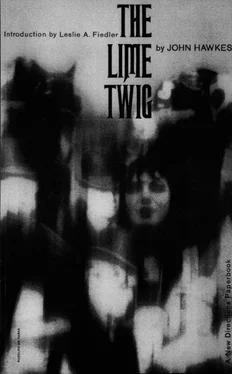I took one step, another. Then there were the high dark sides of the intact bomber and the snow was melting on the iron. I reached the first three-bladed propeller — the two bottom sweeps of steel were doubled beneath the cowling — and for a moment I leaned against it and it was like touching your red cheek to a stranded whale’s fluke when, in all your coastal graveyard, there was no witness, no one to see. I walked round the bubble of the nose — that small dome set on edge with a great crack down the middle — and stood beneath the artistry of Reggie’s Rose. Her leg was long, she sat on her parachute with one knee raised. In the knee cap was a half-moon hole for a man’s boot, above it another, and then a hand grip just under the pilot’s door. So I climbed up poor Rose, the airman’s dream and big as one of the cherubim, and snatched at the high door which, sealed in the flight’s vacuum, sucked against its fitting of rust and rubber and sprang open.
I should have had a visored cap, leather coat, gauntlets. But, glancing once at the ground, poised in the snow over Rose’s hair, I tugged, entered head first the forward cabin.
The cabin roof as well as the front gunner’s dome was cracked and a little snow fell steadily between the seats. In the dark I sat with my hands on the half wheel and slippers resting on the jammed pedals, my head turning to see the handles, rows of knobs, dials with needles all set at zero, boxes and buttons and toggle switches and loop of wire and insulated rings coming down from the roof. In this space I smelled resin and grease and lacquer and something fatty that made me groan.
I tried to work the pedals, turn the wheel. I could not breathe. When suddenly from a hook between two cylinders next to my right hand I saw a palm-shaped cone of steel and took it up, held it before my face — a metal kidney trimmed round the edges with a strip of fur — I looked at it, then lowered my head and pressed my nose and mouth into its drawn cup. My breath came free. The inhalation was pure and deep and sweet. I smelled tobacco and a cheap wine, was breathing out of the pilot’s lungs.
Cold up here. Cold up here. Give a kiss to Rose .
Surely it was Reggie’s breath — the tobacco he had got in an Egyptian NAAFI, his cheap wine — frozen on the slanting translucent glass of the forward cabin’s windows. Layer overlapping icy layer of Reggie’s breath. And I clapped the mask back on its hook, turned a wheel on the cylinder. Leaning far over, sweating, I thrust my hands down and pushed them back along the aluminum trough of floor and found the bottle. Then I found something else, something cool and round to the skin, something that had rested there behind my heels all this while. I set the bottle on top of the wireless box — I heard the sounds of some strange brass anthem coming from the earphones — and reached for that black round shape, carefully and painfully lifted it and cradled it in my lap.
The top of the flying helmet was a perfect dome. Hard, black, slippery. And the flaps were large. On the surface all the leather of that helmet was soft — if you rubbed it — and yet bone hard and firm beneath the hand’s polishing. There were holes for wire plugs, bands for the elastic of a pair of goggles, some sort of worn insignia on the front. A heavy wet leather helmet large enough for me. I ran my fingernail across the insignia, picked at a blemish, and suddenly I leaned forward, turned the helmet over, looked inside. Then I lifted the helmet, gripped it steadily at arm’s length — I was sitting upright now, upright and staring at the polished thing I held — and slowly raised it high and twisting it, hitching it down from side to side, settled the helmet securely on my own smooth head. I extended my hands again and took the wheel.
“How’s the fit, old girl?” I whispered. “A pretty good fit, old girl?” And I turned my head as far to the right as I was able, so that she might see how I — William Hencher — looked with my bloody coronet in place at last.
Give a kiss to Rose .
Between 3 and 4 A.M. on the night she died — so many years ago — that’s when I set out walking with my great black coat that made the small children laugh, walking alone or sometimes joining the crowds and waiting under the echoes of the dome and amid the girders and shattered skylight of Dreary Station to see another trainload of our troops return. So many years ago. And I had my dreams; I had my years of walking to the cathedral in the moonlight.
“My old girl died on these premises, Mr. Banks.”
And then all the years were gone and I recognized that house, that hall, despite the paint and plaster and the cheap red carpet they had tacked on the parlor floor. I paid him in advance, I did, and he put the money in his trouser pocket while Margaret went to lift their awkward sign out of the window. Fresh paint, fresh window glass, new floorboards here and there: to think of the place not gutted after all but still standing, the house lived in now by those with hardly a recollection of the nightly fires. Cheery, new, her dresses in one of the closets and his hat by the door. But one of his four rooms was mine, surely mine, and I knew I’d smell the old dead odor of smoke if only I pushed my face close enough to those shabby walls.
Here’s home, old girl, here’s home.
So I spent my first long night in the renovated room, and I dared not spend that night in the lavatory but smoked my cigars in bed. Sitting up in bed, smoking, thinking of my mother all night long. And then there was the second night and I ventured into the hallway. There was the third night and in the darkened cubicle I listened to the far bells counting two, three, four o’clock in the morning and all that time — thinking now of comfort, tranquillity, and thinking also of their two clasped hands — I wondered what I might do for them. The bells were slow in counting, the water dripped. And suddenly it was quite clear what I could do for them, for Michael and his wife.
I hooked the lavatory door. Then I filled the porcelain sink, and in darkness smelling of lavender and greasy razor blades I immersed my hands up to the wrists, soaked them silently. I dried them on a stiff towel, pushing the towel between my fingers again and again. I wiped the top of my head until it burned. Then I used his talc, showed my teeth in the glass, straightened the robe. I took up the pink-shelled hair brush for a moment but replaced it. And off to the kitchen and then on boards that made tiny sounds, walking with a heavy man’s sore steps, noticing a single lighted window across the court.
It grew cold and before dawn I left the kitchen once: only to pull the comforter off my bed. Again in the kitchen and on Margaret’s wooden stool I sat with the comforter hooded round my head and shoulders, sat waiting for the dawn to come fishing up across the chimney pots and across that dirty gable in the apex of which a weathered muse’s face was carved. When I heard the dog barking in the flat upstairs, when water started running in the pipes behind the wall, and a few river gulls with icy feathers hovered outside the window, and light from a sun the color of some guardsman’s breast warmed my hooded head and arms and knees — why then I got off the stool, began to move about. Wine for the eggs, two pieces of buttered toast, two fried strips of mackerel, a teapot small as an infant’s head and made of iron and boiling — it was a tasteful tray, in one comer decorated with a few pinched violet buds I tore from the plant that has always grown on Margaret’s window shelf. I looked round, made certain the jets were off, thought to include a saucer of red jam, covered the hot salted portions with folded table napkins. Then I listened. I heard nothing but the iron clock beating next to the stove and a boot landing near the dog upstairs.
Читать дальше












